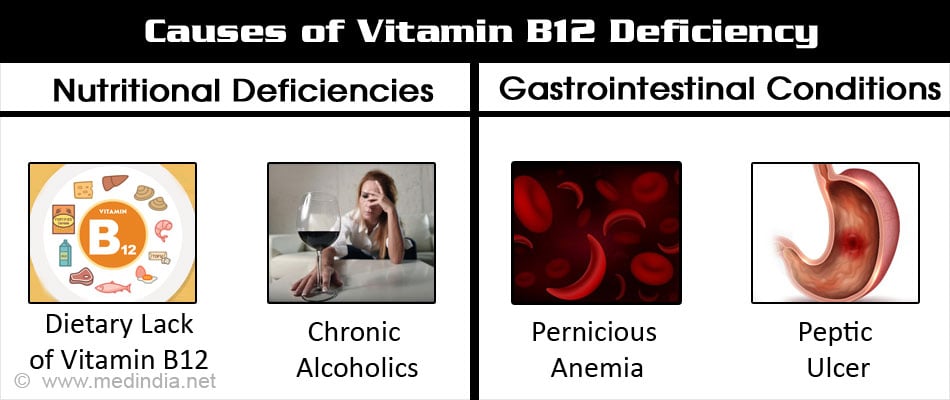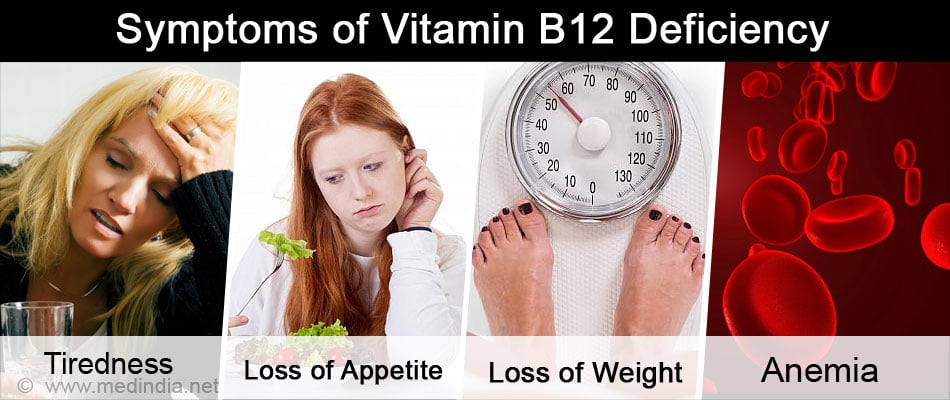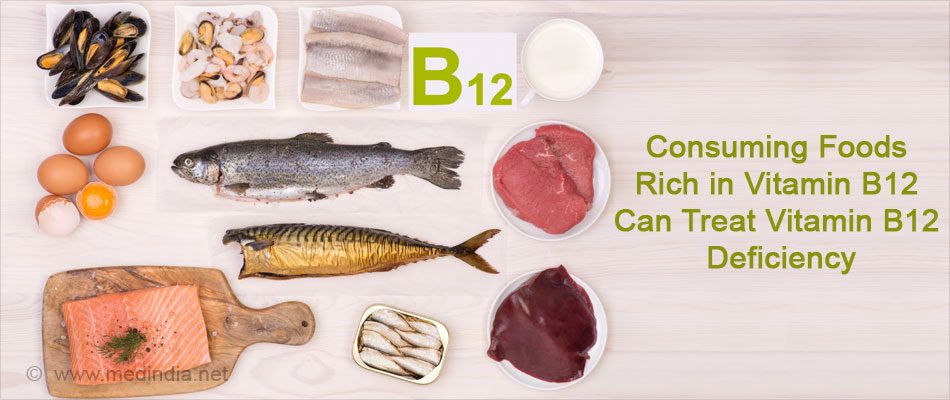- Micronutrients and Macronutrients - (https://www.unicef.org/nutrition/training/2.1/5.html)
- Vitamin B12 - (http://www.mayoclinic.org/drugs-supplements/vitamin-b12/dosing/hrb-20060243)
- Vitamin B12 Deficiency - (http://www.aafp.org/afp/2003/0301/p979.html)
- What Are the Signs and Symptoms of Pernicious Anemia? - (https://www.nhlbi.nih.gov/health/health-topics/topics/prnanmia/signs)
What is Vitamin B12?
Vitamin B12 or cobalamin is a water-soluble vitamin that is present in both dairy and meat products. It is one of the components of the Vitamin B complex. The recommended daily allowance is 2 micrograms. A natural reserve of the vitamin is often maintained in humans in case of conditions that might cause severe malabsorption. Vitamin B12 is necessary for the normal hematological and neurological functioning of the body.
Vitamin B12 absorption starts in the acidic medium that exists in the stomach where it is broken down from the food; it then binds to the intrinsic factor released by the parietal cells of the stomach and this complex is absorbed by the intestine. Once absorbed it binds to transcobalamin II (carrier protein) which transports the vitamin in the body.
Most of the animal and plant products act as sources for our daily dose of vitamins except for some vitamins like vitamin B12 that is exclusive to animal food products. This understanding is required to allow us to choose a balanced diet that fulfills all our nutritional requirements.
What are the Causes of Vitamin B12 Deficiency?
Vitamin B12 deficiency occurs when there are:
Nutritional deficiencies due to reduced intake of foods containing vitamin B12 like:
- Following a vegan diet that does not include foods rich in vitamin B12
- In chronic alcoholics
- In an elderly population on a restricted diet
Gastrointestinal conditions due to reduced or no absorption of vitamin B12 like:
- Pernicious anemia
- Intake of drugs that will affect the absorption of vitamin B12
- Any gastrointestinal condition like peptic ulcer disease, gastrinoma or Zollinger-Ellison syndrome which will affect the absorption of foods

What are the Symptoms and Signs of Vitamin B12 Deficiency?
Vitamin B12 deficiency can result in hematological, neurological and psychiatric manifestations. The symptoms include:
- Generalized tiredness and weakness
- Loss of appetite
- Loss of weight
- Sore, red tongue and mouth ulcers
- Numbness and tingling of hands and feet
- Difficulty in maintaining balance
- Disturbed vision
- Irritability and changes in the personality
- Confusion, poor memory and dementia
- Depression
- Failure to thrive and development delays in infants
Anemia is a condition which is caused by vitamin B12 deficiency and is due to insufficient numbers of red blood cells thereby reducing their capacity to carry oxygen to different parts of the body. At some points there may be a reduction in white and red blood cells and platelets called pancytopenia.

What are the Complications of Vitamin B12 Deficiency?
Vitamin B12 deficiency if undiagnosed can result in serious and irreversible damages that include:
- Cardiac failure if the anemia is not treated early.
- Complications in pregnancy and birth defects in children.
How do you Diagnose Vitamin B12 Deficiency?
- A blood/hematological test will reveal normal to low hemoglobin levels and a blood microscopy will reveal vitamin B12 deficiency. Serum vitamin B12 levels that are below 200 picograms per milliliter or pg/ml along with clinically relevant findings are considered a deficiency. In elderly patients neuropsychiatric findings may be more prevalent than hematological results.
- Studies reveal that testing of two important markers, namely, methylmalonic acid and homocysteine levels can also be used to identify a vitamin B12 deficiency. An elevated methylmalonic acid level indicates vitamin B12 deficiency.
When a person is suspected for anemia further tests need to be done to identify the root cause for this deficiency, whether it is due to reduced intake or some internal condition affecting the absorption.
How do you Treat Vitamin B12 Deficiency?
Before the beginning of the treatment, folic acid (vitamin B9) levels should also be checked to differentiate whether it is case of vitamin B12 deficiency or folic acid deficiency so as to treat accordingly.
Missing out on a folic acid deficiency will also affect the well-being of the patient. In some conditions while treating a folic acid deficiency a vitamin B12 deficiency may go masked if both vitamin B12 and folic acid levels are not checked prior.
The treatment modalities for vitamin B12 deficiency include:
- Diet modification by including food like shellfish, crab, salmon, liver, mackerels, egg, cheese and fortified grains in the daily diet.

- Supplements may be required to tide over the deficiency state. Supplementation may be oral or injectable. Oral supplementation is followed when oral absorption is not affected. Here the condition is often diet related. Even pernicious anemia can be treated with the oral route. Injectable supplementation is given when oral absorption is not possible for the patient.
Following the treatment commencement, monitoring of vitamin B12 levels should be done in 10-14 days to evaluate the progress and to chalk out further treatment plans.
How do you Prevent Vitamin B12 Deficiency?
- Regular checkups for vitamin B12 levels have to be done in case the person:
- Is strictly vegetarian/vegan
- Is above 50 years
- Has had a weight loss surgery
- Is on a regular intake of proton pump medication
- Supplement regular diet with milk and animal products containing vitamin B12.
- Reduce or abstain from alcohol intake to prevent vitamin deficiency.
- If dietary intake of vitamins is low then multivitamin supplementation containing vitamin B12 may be started.











